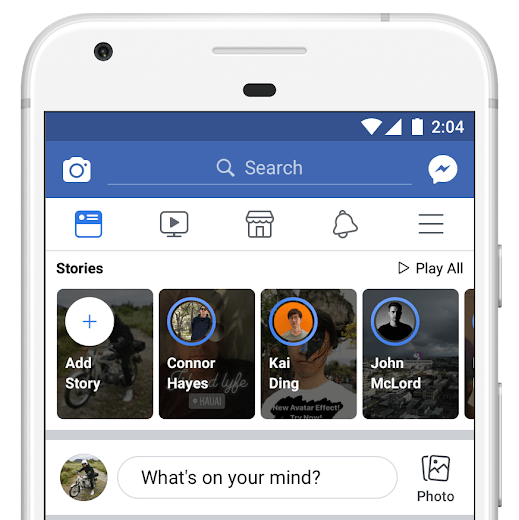Facebook isn’t backing down from Stories despite criticism that it copied Snapchat and that Instagram Stories is enough. Instead, it’s committed to figuring out how to adapt the slideshow format into the successor to the status update. That’s why today the company is launching three significant tests that make Facebook Stories a default way to share.
“The way people share and connect is changing; it’s quickly becoming more real-time and visual. We’re testing new creative tools to bring pictures and videos to life, and introducing easier ways to find and share stories” a Facebook spokesperson told me.
Facebook has so many features that it has to make tough decisions about which to promote and which to bury. It often launches features with extra visibility at first, but forces them to grow popular on their own before giving them any additional attention. Facebook is vulnerable to competitors if it doesn’t make Stories work, and users may eventually grow tired of the News Feed full of text updates from distant acquaintances. But Instagram Stories and WhatsApp’s version Status have both grown to over 250 million daily users, showing there’s obviously demand for this product if Facebook can figure out how Stories fit in its app.
Hence, these tests:
- The Facebook status composer on mobile will immediately show an open camera window and the most recent images in your camera roll to spur Stories sharing. Given that Facebook has as many as 17 choices for status updates from checkins to recommendations to GIFs, the new camera and camera roll previews make Stories a much more prominent option. Facebook isn’t going so far as to launch with the camera as the home screen like Snapchat, or half the screen like it once tried, but it clearly believes it will be able to ride the trend and people will get more out of sharing if they choose Stories. This starts testing today to a small subset of users around the world.
- When you shoot something with the augmented reality-equipped Facebook Camera feature, the sharing page will now default to having Stories selected. Previously, users had to choose if they wanted to post to Stories, News Feed, or send their creation to someone through Messenger. Facebook is now nudging users to go with Stories, seemingly confident of its existing dominance over the ranked feed and messaging spaces. This will test will all users in the Dominican Republic.
- Above the News Feed, Facebook Stories will show up with big preview tiles behind the smaller profile pictures of the people who created them. Teasing what’s inside a Story could make users a lot more likely to click to watch them. Facebook uses a similar format but with smaller preview circles on Messenger. And while Instagram leaves more room for the main feed by just showing profile pic bubbles for Stories, if you keep scrolling you might see a call out in the feed for Stories you haven’t watched using a big preview tile format similar to what Facebook Stories is trying. More views could encourage users to share more Stories, helping to dismantle the ghost town perception of Facebook Stories. This will also tests to a small percentage of users around the world.

If Facebook finds these tests prove popular, they could roll out everywhere and make Stories a much more central part of the app’s experience. Facebook will have to avoid users feeling like Stories are getting crammed down their throats. But seeing the camera option, defaulting camera content to Stories, and seeing bigger preview all disappear with a quick tap or swipe.
The fact is that the modern world of computing affords a very different type of social media than when Facebook launched 14 years ago. Then, you’d update your status with a line of text from your desktop computer because your phone didn’t have a good camera or maybe even the internet, screens were small, mobile networks were slow, and it was tough to compute on the go. Now with every phone equipped with a great camera, a nice screen, increasingly fast mobile networks, and everyone else staring at them all the time, it makes sense to share through photos and videos you post throughout the day.
This isn’t a shift driven by Facebook, or even really Snapchat. Visual communication is an inevitable evolution. For Facebook, Stories aren’t an “if”, just a “how”.

